“Dedication is everything.”
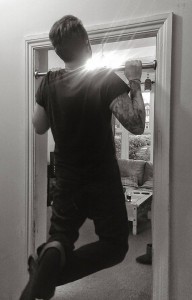
Welcome back regular readers. After a brief hiatus to deal with some urgent project work I have returned, ready to rock and share my headway with you. Don’t worry, I didn’t stop conditioning! As we’re a little way behind my progress I’ll be posting month long updates every fortnight until we’re up to speed – so check Paleo Minds for regular articles and all the other great content.
This article covers the third month of my journey into convict conditioning. You’ll recall I’d switched up to the Veterano Plan the previous fortnight and was chipping away at the programme one exercise a night with the seventh off. This approach suited me, the progressions were intensifying and the extra breathing room really helped me to power through the tougher ones, without being depleted from another exercise. Veterano isn’t for everyone though, the workouts were shorter but double the warming up and down meant I was putting in more hours per week. At this point I didn’t have many other big time commitments so it didn’t feel like an imposition, but I can see a busier life eroding such a plan pretty easily unless it’s made top priority.
Bridge Progression
Confession time, I’d completed the first of the bridge progressions, short bridges, by week five but ran out of space in the last article. I stepped into straight bridges confidently after crushing 150 short bridges without a rest the previous week and was squarely flattened by the new exercise. The learning curve with bridges is much steeper than other progressions and I can see why The Coach suggests to leave the bridge and handstand pushups until the other exercises are firmly established. A less dedicated or committed practitioner could be disheartened, then again dedication is everything.
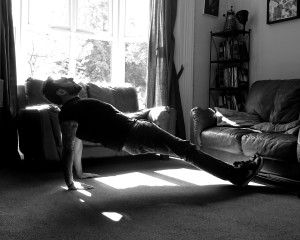 The exercise isn’t complicated but it took some getting used to. The ‘convict’ starts seated on the floor, legs stretched out, feet together and palms flat on the floor next to the buttocks. By pushing down through the heels and palms the convict lifts the body to a straight line between heels and shoulders by flexing the back muscles (primarily the erector spinae). Sounds easy right? It isn’t hard for the first rep or two… but doing it repeatedly is a different proposition, my back wasn’t used to moving like that, I suspect it’s primarily used as a stabilising muscle but the straight bridges had it working in a very different way.
The exercise isn’t complicated but it took some getting used to. The ‘convict’ starts seated on the floor, legs stretched out, feet together and palms flat on the floor next to the buttocks. By pushing down through the heels and palms the convict lifts the body to a straight line between heels and shoulders by flexing the back muscles (primarily the erector spinae). Sounds easy right? It isn’t hard for the first rep or two… but doing it repeatedly is a different proposition, my back wasn’t used to moving like that, I suspect it’s primarily used as a stabilising muscle but the straight bridges had it working in a very different way.
Often I’d experience a kind of nausea from the effort of using the back muscles so, obviously I soldiered on, upper lip stoically stiffened but sweaty. The exercise is fairly compound in nature, also impacting the the shoulder muscles and core, holding the bridge gave a solid burn down my upper arms which briefly acted as a barrier in its own right until my body adjusted and toughened up. The progression standard is three sets of forty reps and progress was steady, by the end of the third month I was about two thirds of the way there and determined to get the damn thing done and behind me!
Crow Stand Nemesis
I made a lot of progress with the dreaded crow stand this month and it 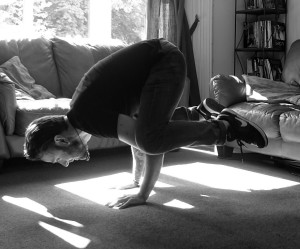 stopped feeling quite so nemesis-like! As it’s more a balance than a resistance move I’d upped the pace and was hitting it every second day to bully my body into taking it seriously. About halfway through the month something clicked in my brain, the trick is to lean forward more than you think you need to. It’s counter instinctive as you’re basically pushing your face towards the floor and your mind is saying “yes I see, but daaaaaaangeeeeer!” So you have to kick that fear in the nuts and push through; once I’d got this everything else fell into place, the position became more stable as my centre of gravity was closer to above my hands and I wasn’t burning all my energy holding an unbalanced position. It was still tough but by the end of the month I was holding up to fifty four seconds and I could feel time and space bending around me, or I was skirting a stroke, one of the two.*
stopped feeling quite so nemesis-like! As it’s more a balance than a resistance move I’d upped the pace and was hitting it every second day to bully my body into taking it seriously. About halfway through the month something clicked in my brain, the trick is to lean forward more than you think you need to. It’s counter instinctive as you’re basically pushing your face towards the floor and your mind is saying “yes I see, but daaaaaaangeeeeer!” So you have to kick that fear in the nuts and push through; once I’d got this everything else fell into place, the position became more stable as my centre of gravity was closer to above my hands and I wasn’t burning all my energy holding an unbalanced position. It was still tough but by the end of the month I was holding up to fifty four seconds and I could feel time and space bending around me, or I was skirting a stroke, one of the two.*
Raise
After sweating and sometimes swearing through three sets of knee tucks, the rest of the leg raise progression felt like a stroll in the proverbial park. I’ve historically worked my core harder than everything else because I’ve always carried a bit of a gut and didn’t always understand it’s a full body process (as I talked about last time). This seems to have have stood me in good stead as I blasted through two more levels of leg raises, flat frog raises and flat straight raises without much in the way of resistance. In fact I hit progression standard for both on my first attempt and repeated it the second week to ensure my form was perfect.
They aren’t exotic exercises and progress logically from flat bent raises, both start from lying flat on the floor and the leg is raised to vertical. The starting positions vary in that the legs are bent to about 45 degrees for flat frog raises and held straight for flat straight raises (surprise twist!). For the flat frog raises the legs are then straightened at vertical and lowered back down straight. I can appreciate how this is a clever halfway house for people still building their core but for me it was very much a stepping stone to the more challenging progressions later.
Push
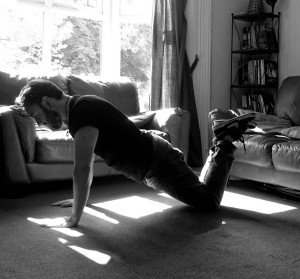 I polished off the final reps of the incline pushup early in the month and moved up to step three on the progression, kneeling pushups. If I’m honest I was starting to feel a twinge of impatience here, kneeling pushups were traditionally the soft option given to the weedies at classes. An irrational part of me railed against the idea out of dumb Neanderthal pride, but saner heads prevailed, I trusted The Coach and got on with it.
I polished off the final reps of the incline pushup early in the month and moved up to step three on the progression, kneeling pushups. If I’m honest I was starting to feel a twinge of impatience here, kneeling pushups were traditionally the soft option given to the weedies at classes. An irrational part of me railed against the idea out of dumb Neanderthal pride, but saner heads prevailed, I trusted The Coach and got on with it.
Kneeling pushups are pretty much exactly what they sound like, but again with the unforgivingly close Convict Conditioning hand position to make it, you know, tough… Surprisingly it was hard, the hands under shoulders position forces the elbows back against the body and much of the work onto the poor unsuspecting triceps, it was a bloodbath. Well, no, but it started burning disconcertingly early and shifted the focus onto getting the reps done with good form and holding the back straight so not to buckle or cheat. The progression standard was three sets of thirty reps; I worked hard, pushed myself at the end of the sets and finished the month in the early twenties with a new respect for the exercise and a definite swell of definition in my arms and chest.
Pull
Pullups felt like a steady march through the month, I finally put horizontal pulls to bed and moved up to step three, jackknife pulls, which I found much more agreeable. Where I’d had to pull a table into the barred doorway to make horizontal pulls practicable, jackknife pulls are intended to be done that way so felt a natural progression.
The exercise begins hanging from the bar in a seated position with the heels resting on a table in front. As the exercise draws the body up, the core straightens adding pressure through the heels which takes some of the weight. This forms a much needed mid-step between the introductory movements and later free hanging progressions. It’s possible my jury rigged setup made the previous step harder than The Coach intended hence I seemed to move through this step at a relatively fast pace.
Squat
Squats turned out to be the second major revelation for me this month. Step three, supported squats, I would return to again and again for warmups and tendon conditioning over the coming months. A supported squat is pretty much what it sounds like, squatting down with the palms flat on a waist height surface for stability, similar to the previous step but the hands are higher so provide less assistance. The exercise is intended to condition the knees and tendons for the deep squat position taught by Convict Conditioning, squatting down until the back of the calves and thighs touch. It also gives a great stretching and conditioning effect to the achilles tendons, ironically my Achilles’ heel too.
Having long embraced the many benefits of squats I didn’t find the exercise itself particularly strenuous; I hit three sets of thirty on my second week and progressed on the third to half squats. The latter are what most people call squats, but Convict Conditioning is hardcore and calls them breakfast. I’m sure you know the exercise, feet shoulder width, sit down into a 90 degree squat, hold a beat and stand back up again, once you can do two sets of fifty you can move onto the main course! Obviously a hundred half squats with perfect form (always with perfect form) isn’t going to pass unnoticed but I was already getting close to progressing again by the end of the month.
As I said earlier I’m writing a little behind my progress now and most of my warmups, even when I’m running involve supported squats, they’re a perfect blend of stretch and cardio to get me ready to workout. Overall a solid month of gains and progress, my nemesis was on the ropes, the plan was pushing me towards ever tougher progressions and I was really starting to feel the difference in strength and in the mirror.
*Note: I say this with a measure of comic effect, I know my limits, when to push them and when to respect them. If you’re working out so hard you feel dizzy or faint then stop, catch your breath and collect yourself. Getting hurt for one rep is a sure-fire way to bin months of training.
 Paleo Minds Paleo diet, fitness and lifestyle.
Paleo Minds Paleo diet, fitness and lifestyle.

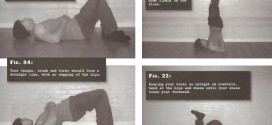


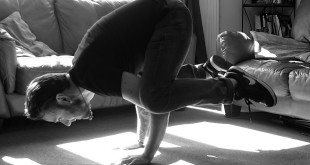
Hi Steve!
Not sure if you’re still checking these posts as its been a few years?
Anywho, I’ve been doing new blood for quite some months now, as I seem to have gotten confused. I was of the impression that each step should be taken as detailed (IE; complete beginner standard of 10 perfect reps then wait until next week) having relatively little previous experience of any type of strength training, I just assumed that this was correct, despite completing workouts some weeks barely feeling tired at all.
Judging by your comments, is the idea to work each exercise to progression standard, or as close as possible as you can, until you can do no more? It seems from the article that you are doing as many of the exercises as you physically can? Apologies for the long-winded comment, very much hopeful of a reply! TIA!
Hi Anthony, thanks for reading! Yeah, the idea is to get to progression standard, or as many reps as you can towards it with clean, solid form.
The program starts from a rehabilitation point of view so if you’ve got a moderate standard of fitness you’ll plough through some of the early steps with relative ease. The trick is to still do them mindfully as you’re preparing your joints for the really chewy stuff later. – Steve